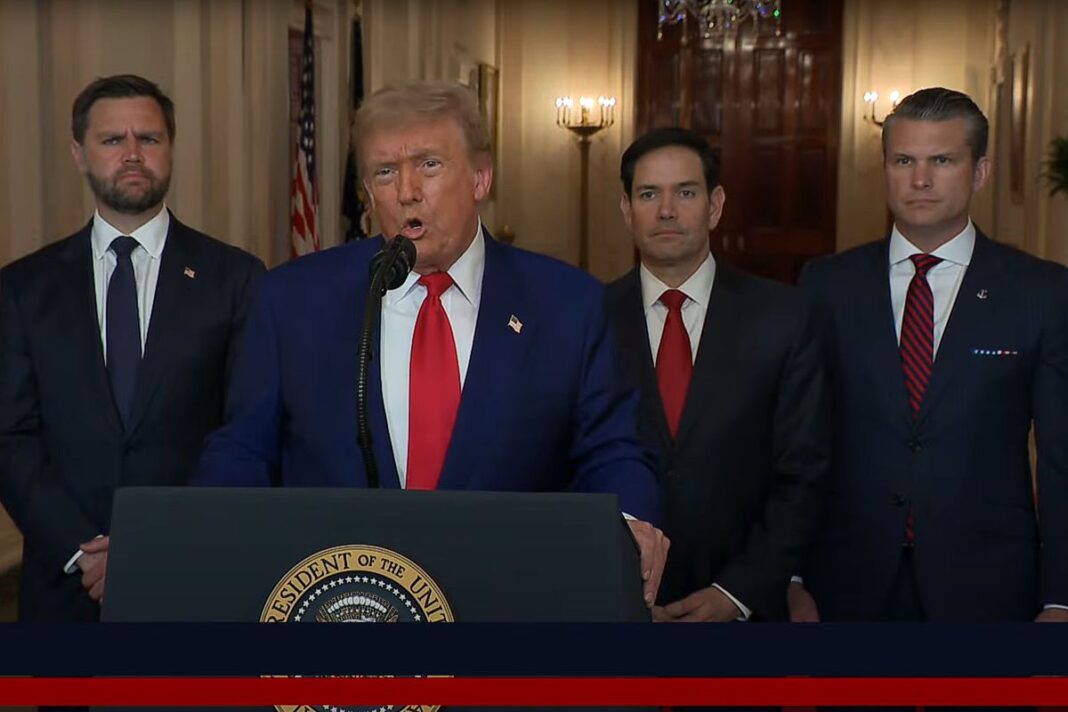Iran reserves “all options” to respond to U.S. military strikes on its nuclear facilities on Saturday night, said Foreign Minister Abbas Araqchi on Sunday morning.
In a statement released on social media, Araqchi said that the strikes “are outrageous and will have everlasting consequences.”
He said Iran now “reserves all options to defend its sovereignty, interest, and people” in accordance with the United Nations Charter.
Hours later, the foreign minister suggested in a separate statement that diplomacy between Iran and the United States is now off the table following the strikes, which were conducted about a week after Israel launched a number of airstrikes on Iranian infrastructure in a bid to degrade the country’s nuclear capabilities. In response, Iran has launched hundreds of missiles at Israel, striking residential buildings, a hospital, and a mosque last week.
Earlier this month, President Donald Trump said that a 60-day deadline set in April for Iran to negotiate a deal to give up its nuclear program expired in mid-June—a day before Israel launched an attack on key infrastructure. Trump reiterated that Iran cannot obtain a nuclear weapon.
In 2020, Iran launched a number of missiles at U.S. bases in the Middle East after the Trump administration ordered the strike killing Iranian commander Qassem Soleimani after saying that he was responsible for a number of terrorist attacks in the region that targeted U.S. troops and other assets. Several dozen American soldiers suffered minor injuries in those attacks.
It’s not clear if Iran will do the same. As of the morning of June 22, there has been no public indication that Tehran is planning on launching strikes against U.S. assets in the region.
On Sunday, Iranian officials said via state-run Tasnim News that Iran for the first time launched what it described as a multi-warhead missile at Israel, claiming it hit several targets. The Israel Defense Forces wrote in a statement on social media Sunday morning that sirens were heard going off due “to another Iranian missile attack.”
U.S. Defense Secretary Pete Hegseth said that the strikes targeting nuclear facilities in Iran were not designed to bring about regime change in the country, which has been under autocratic Islamic rule since 1979, when Muslims overthrew the Pahlavi monarchy.
“This mission was not and has not been about regime change,” Hegseth told reporters at the Pentagon Sunday. “The president authorized a precision operation to neutralize the threats to our national interests posed by the Iranian nuclear program.”
Seven B-2 stealth bombers flew for 18 hours from the United States to Iran to drop 14 bunker-buster bombs, Gen. Dan Caine, chairman of the Joint Chiefs of Staff, told reporters.
In total, the U.S. military launched 75 precision-guided munitions, including more than two dozen Tomahawk missiles, and using more than 125 military aircraft, in the operation against three nuclear sites, Caine said.
“Our forces remain on high alert and are fully postured to respond to any Iranian retaliation or proxy attacks, which would be an incredibly poor choice,” Caine said, referring to a possible response to Iranian aggression against the United States.
Late on Saturday, Trump delivered a televised address to the American public, announcing that the U.S. strikes “were a spectacular military success” and that “Iran’s key nuclear enrichment facilities have been completely and totally obliterated.”
In a speech that lasted just over three minutes, Trump said Iran’s future holds “either peace or tragedy,” and that there are many other targets that could be hit by the U.S. military. “If peace does not come quickly, we will go after those other targets with precision, speed, and skill.”
Trump also wrote on Truth Social that Iran’s Fordow nuclear facility has been destroyed after bombs were dropped on the site.
Reuters contributed to this report.







